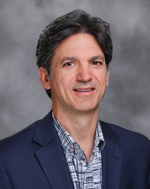
Martin is a Program Director at the National Institute of Biomedical Imaging and Bioengineering (NIBIB). He is an internationally recognized academic and entrepreneurial biomedical engineer and medical physicist. At Duke University, where he was a tenured Associate Professor of Radiology, Associate Professor of Biomedical Engineering, and a Medical Physics Graduate Program faculty, he launched and/or managed several international collaborative teams to design, construct, characterize and clinically evaluate next-generation, high-performance 3-dimensionally accurate diagnostic imaging systems. These technologies have included: Molecular Breast Imaging (MBI), Single Photon Emission Computed Tomography (SPECT) and dedicated breast SPECT, x-ray cone-beam Computed Tomography (CT), x-ray diffraction tomography, hybrid SPECT/CT technology, dedicated breast Positron Emission Tomography (PET) and hybrid PET/Magnetic Resonance Imaging (MRI) systems. In addition to diagnostic medical imaging and biomedical engineering, his activities have employed clinical medical physics involving nuclear medicine & radiotheranostics dosimetry. During his 27+ year academic career at Duke, he directly mentored dozens of MS, MD and PhD students in his laboratory (and others), he organized and arranged numerous domestic and international conferences & workshops, and helped establish and grow the Medical Physics Graduate Program at Duke. He also contributed his service in local, national and international education and collaborations to propel biomedical imaging research and clinical medical imaging. This service also includes his varied contributions to periodical peer review, and to the inter/national grant review process through foundations and State & Federal Governments.
His B.A. was in Physics, with a minor in Chemistry from Cornell University, and he received his Ph.D. in Biomedical Physics, focused in Nuclear Medicine from UCLA. His is also a Diplomate of the American Board of Science in Nuclear Medicine in nuclear medicine physics and instrumentation. He has a wide range of scholarly and research accomplishments and scientific service experience, with over 20 years of continuous grant funding.
